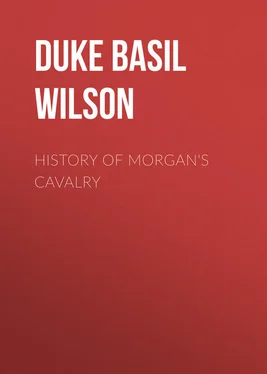Basil Duke - History of Morgan's Cavalry
Здесь есть возможность читать онлайн «Basil Duke - History of Morgan's Cavalry» — ознакомительный отрывок электронной книги совершенно бесплатно, а после прочтения отрывка купить полную версию. В некоторых случаях можно слушать аудио, скачать через торрент в формате fb2 и присутствует краткое содержание. Издательство: Иностранный паблик, Жанр: foreign_antique, foreign_prose, на английском языке. Описание произведения, (предисловие) а так же отзывы посетителей доступны на портале библиотеки ЛибКат.
- Название:History of Morgan's Cavalry
- Автор:
- Издательство:Иностранный паблик
- Жанр:
- Год:неизвестен
- ISBN:нет данных
- Рейтинг книги:3 / 5. Голосов: 1
-
Избранное:Добавить в избранное
- Отзывы:
-
Ваша оценка:
- 60
- 1
- 2
- 3
- 4
- 5
History of Morgan's Cavalry: краткое содержание, описание и аннотация
Предлагаем к чтению аннотацию, описание, краткое содержание или предисловие (зависит от того, что написал сам автор книги «History of Morgan's Cavalry»). Если вы не нашли необходимую информацию о книге — напишите в комментариях, мы постараемся отыскать её.
History of Morgan's Cavalry — читать онлайн ознакомительный отрывок
Ниже представлен текст книги, разбитый по страницам. Система сохранения места последней прочитанной страницы, позволяет с удобством читать онлайн бесплатно книгу «History of Morgan's Cavalry», без необходимости каждый раз заново искать на чём Вы остановились. Поставьте закладку, и сможете в любой момент перейти на страницу, на которой закончили чтение.
Интервал:
Закладка:
Price and Van Dorn were ordered from Arkansas, Bragg was ordered from Pensacola, all the available troops at New Orleans, and every point in the department where troops were stationed, were called into the field, and the concentration of all at Corinth, in Northern Mississippi, was arranged. Here he would have every thing massed and in hand, and in his rear would be no danger, nor indefensible line by which danger could menace him. His adversaries on the contrary would be separated from each other; rivers and all the perils of a hostile population would be between them and safety, if they were defeated or forced to turn and retreat; energy and promptness would enable him to strike them heavy blows before they could unite; if every detail of his plan worked right, he might hope to outnumber them at every collision.
This plan would require the evacuation of Columbus, even if the occupation of New Madrid did not; but there was no longer any use of holding Columbus, after a retreat to Mississippi had been decided upon. Its garrison would help to swell the ranks of the army for the decisive battle – and if that battle were won, territory far North of Columbus would be gained. Therefore, braving censure and remonstrance more general, energetic, and daring, than was ever encountered by any Confederate officer, before or since, General Johnson turned his back upon Kentucky and commenced the retreat which culminated in the battle of Shiloh. When the dangers from which this retreat extricated him, the favorable position in which it placed him for offensive operations, the exact calculation of the proper time to turn retreat into attack, and the electric rapidity and courage with which the latter was done – when all the features are considered, is it claiming too much to say that no conception of the war was more magnificent?
The evacuation of Bowlinggreen was commenced on the 14th of February, and notwithstanding the discontent of the troops, was accomplished in perfect order. On the day after it was all over, the enemy arrived upon the opposite bank of Barren river – the bridges had all, of course, been burned – and shelled the town which he could not immediately enter.
The weather for the week following the evacuation, was intensely cold, and the troops accustomed, for the most part, to comfortable quarters during the winter, and exposed for the first time to real hardships, suffered severely. Still, after the first murmuring was over, they were kept in high spirits by the impression, assiduously cultivated by their officers, that they were marching to surprise and attack Thomas, who was supposed to have compromised himself by an imprudent pursuit of Crittenden.
The news from Donelson, where the fight was then raging, was very favorable, and the successful defense of the fort for several days encouraged even General Johnson to hope that it would be held and the assailants completely beaten off.
As the army neared Nashville, some doubts of the truth of the programme which the men had arranged in their imaginations began to intrude, and they began to believe that the retreat meant in good earnest the giving up of Kentucky – perhaps something more which they were unwilling to contemplate. While they were in this state of doubt and anxiety, like a thunder-clap came the news of the fall of Donelson – the news that seven thousand Confederate were prisoners in the hands of the enemy.
General Johnson, himself, was thoroughly surprised by the suddenness of the disaster, for, six hours before he received information of the surrender, he had been dispatched that the enemy had been signally repulsed, and were drawing off, and until the intelligence came of the fate of the garrison, he had learned of no new attack. The depression, which this information produced, was deepened by the gloom which hung over Nashville when the troops entered. It is impossible to describe the scene. Disasters were then new to us, and our people had been taught to believe them impossible. No subsequent reverse, although fraught with far more real calamity, ever created the shame, sorrow, and wild consternation which swept over the South with the news of the surrender of Donelson. And in Nashville, itself sure to fall next and speedily, an anguish and terror were felt and expressed, scarcely to be conceived by those who have not witnessed a similar scene. All the worst evils which follow in the train of war and subjugation seemed to be anticipated by the terrified people, and the feeling was quickly communicated to the troops, and grew with every hour until it assumed almost the proportions of a panic. The Tennessee troops were naturally most influenced by the considerations which affected the citizens, but all shared the feeling. Some wept at the thought of abandoning the city to a fate which they esteemed as dreadful as utter destruction, and many, infuriated, loudly advocated burning it to the ground that the enemy might have nothing of it but its ashes.
During the first night after the army reached Nashville, when the excitement and fury were at the highest pitch, and officers and privates were alike influenced by it, it seemed as if the bonds of discipline would be cast off altogether. Crowds of soldiers were mingled with the citizens who thronged the streets all night, and yells, curses, shots rang on all sides. In some houses the women were pale and sobbing, and in others there was even merriment, as if in defiance of the worst. Very soon all those who had escaped from Donelson began to arrive.
Forrest had cut his way through the beleaguering lines and brought off his entire regiment. He reached Nashville on the day after it was entered by the army. It was impossible for the infantry men who escaped to make their way from the scene of disaster, except in small detachments. They were necessarily scattered all over the country, and those who reached Nashville in time to accompany the army upon its farther march, came in as stragglers and without any organization. Neither men nor officers had an idea of how or when they were to do duty again. The arrival of these disbanded soldiers, among whom it was difficult to establish and enforce order, because no immediate disposition could be made of them, increased the confusion already prevailing. Rumors, too, of the near approach of the enemy were circulated, and were believed even by officers of high rank.
Buell's army, which was really not far south of Bowlinggreen, was reported to be within a few miles of the city, and the Federal gunboats, which had not yet reached Clarksville, were confidently declared to be within sight of Fort Zollicoffer, only seven miles below Nashville.
Upon the second day matters had arrived at such a state, and the excitement and disorder were so extreme, that it became necessary to take other precautions to repress the license that was prevailing, besides the establishment of guards and sentinels about the camps where the troops lay, and General Johnson ordered the establishment of a strong military police in Nashville. The First Missouri infantry, one of the finest and best disciplined regiments in the service, was detailed for this duty, and Morgan's squadron was sent to assist it. Our duty was to patrol the city and suburbs, and we were constantly engaged at it until the city was evacuated. General John B. Floyd, of Virginia, was appointed commandant of Nashville, and entrusted with the enforcement of discipline and with all the details of the evacuation. His task was one of no ordinary difficulty. It was hard, at such a time, to know how to begin the work. In such a chaos, with such passions ruling, it seemed folly to hope for the restoration of order. Those who remember the event, will recall the feeling of despair which had seized upon the soldiery – the entire army seemed, for the time, hopeless of any retrieval of our fortunes, and every man was thoroughly reckless. Few excesses were committed; but, with such a temper prevailing, the worst consequences were to be apprehended, if the influence of the officers should be entirely lost and the minds of the men should be directed to mischief. General Floyd would have found the demoralization and license which had grown apace among the troops, and the terrors of the citizens, serious impediments to his efforts to remove the valuable stores which had been collected in Nashville, even if he had possessed abundant facilities for their removal. But of such facilities he was almost entirely destitute. The trains with the army were needed for transportation of supplies for immediate use. The scanty wheel transportation which belonged to captured and disorganized commands, and had been brought to the city, could scarcely be made available. When it could be discovered and laid hold of, the wagons and teams were usually found to be unserviceable. General Floyd's first care (after satisfying himself by active scouting, that there was no truth in the reports of the proximity of the enemy, and burning the bridge at Edgefield junction), was to make arrangements for saving as many of the stores as was possible, giving the preference to ordnance stores. For this purpose he ordered an impressment of transportation in Nashville and the vicinity, making a clean sweep of every thing that ran on wheels. In this manner some eighty or ninety vehicles were gotten together, with teams, and as many loads of ordnance stores were saved for the army. He issued orders that the citizens should be permitted to help themselves to the remaining stores, and a promiscuous scramble for clothing, blankets, meat, meal, and all sorts of quartermaster and commissary stores, commenced and lasted three days. Occasionally, a half-drunken, straggling soldier, would walk into the midst of the snatchers, with gun on shoulder and pistol at his belt, and the citizens would stand back, jackall like, until he had helped himself. Crowds would stand upon the pavements underneath the tall buildings, upon the Court House Square, while out of their fourth and fifth-story windows large bales of goods were pitched, which would have crushed any one upon whom they had fallen. Yet numbers would rush and fasten upon them, while other bales were already in the air descending. Excitement and avarice seemed to stimulate the people to preternatural strength. I saw an old woman, whose appearance indicated the extremest decrepitude, staggering under a load of meat which I would have hardly thought a quartermaster's mule could carry. Twice during the first day of these scenes, orders were received by a portion of Forrest's regiment, drawn up on the Square, to stop the appropriation of stores by the citizens, and they accordingly charged the crowd (deaf to any less forcible reason) with drawn sabers; several men were wounded and trampled upon, but fortunately none were killed. Nothing could have been more admirable than the fortitude, patience and good sense which General Floyd displayed in his arduous and unenviable task. He had, already, for ten days, endured great and uninterrupted excitement and fatigue; without respite or rest, he was called to this responsibility and duty. Those who have never witnessed nor been placed in such situations, can not understand how they harass the mind and try the temper.
Читать дальшеИнтервал:
Закладка:
Похожие книги на «History of Morgan's Cavalry»
Представляем Вашему вниманию похожие книги на «History of Morgan's Cavalry» списком для выбора. Мы отобрали схожую по названию и смыслу литературу в надежде предоставить читателям больше вариантов отыскать новые, интересные, ещё непрочитанные произведения.
Обсуждение, отзывы о книге «History of Morgan's Cavalry» и просто собственные мнения читателей. Оставьте ваши комментарии, напишите, что Вы думаете о произведении, его смысле или главных героях. Укажите что конкретно понравилось, а что нет, и почему Вы так считаете.












